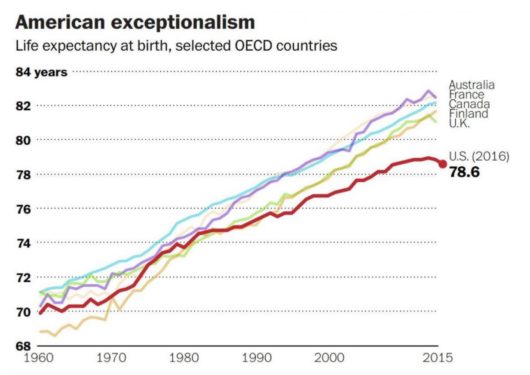Unprecedented: Life expectancy in the US has declined for the third straight year. Infants born in 2017 are expected to live on average just 78.6 years. That’s down from 78.7 years in 2016/2015 and down from 78.9 years in 2014. An important context is to realize that life expectancy in the USA has not declined since the Spanish Flu Epidemic in 1918.
What is fueling this reversal in America’s health progress? Clearly, every cause of death has multiple contributing factors. But in the present case, diseases of despondency stand out most boldly: suicide and drug overdoses. “Tragically, this troubling trend (decreasing life expectancy) is largely driven by deaths from drug overdose and suicide,” Dr. Robert Redfield, CDC Director, stated. “Life expectancy gives us a snapshot of the nation’s overall health, and these sobering statistics are a wakeup call that we are losing too many Americans, too early and too often, to conditions that are preventable.”
By contrast, overall health in Africa has grown astonishingly. Life expectancy for the continent in 2000 was 50.6 years. Today, it has grown to 60 years! In fact, not one sub-Saharan country experienced a fall in life expectancy between 2000 and 2014, What can be credited for this dramatic progress? Yvonne Mhango, sub-Saharan economist and a native of Malawi, cites control of the HIV/AIDS epidemic, and adds, “When I was growing up in the 1980s and 1990s, HIV/AIDS killed a lot of the working-age population. It hasn’t been eradicated but the introduction of antiretroviral drugs that are affordable and accessible to low-income people has helped to lengthen their lives. They are able to work and look after their families. That has made a big difference.” Yvonne Mhango continues, “We have seen a lot of programs and interventions, such as impregnated bed nets (to combat malaria), immunization campaigns and also a strong commitment on the part of Africa’s leadership to really push for a survival revolution.”
For all of us in healthcare, what is the takeaway? For one, these phenomena are a reminder of the interconnected nature of physical health with social norms, mental health, and economic vitality. Whatever interventions improve one will likely also improve the others. Another takeaway is the importance of continued vigilance. Just as every new generation must be immunized against tetanus, a plethora of other recognized health safeguards must also be assured to prevent a nation from losing its hard-won gains.


